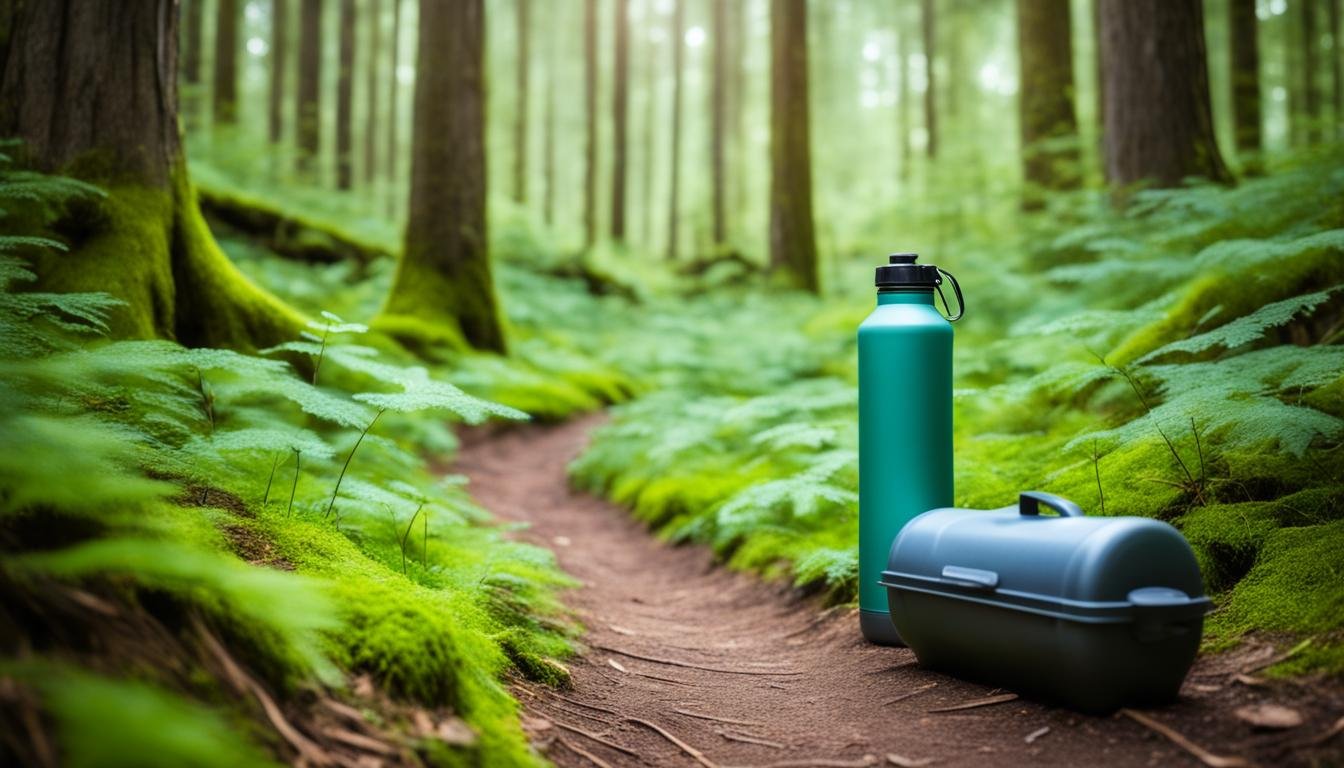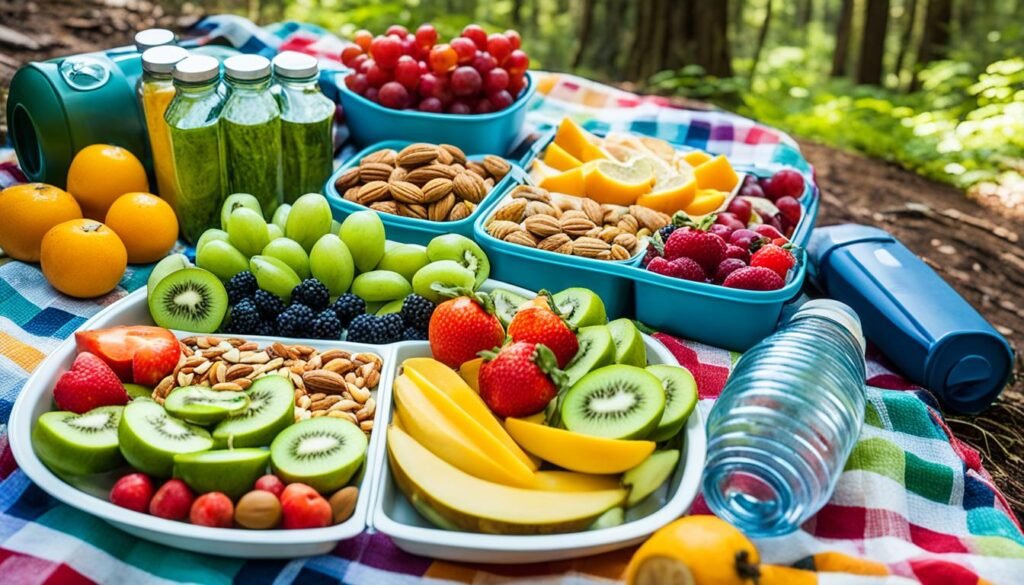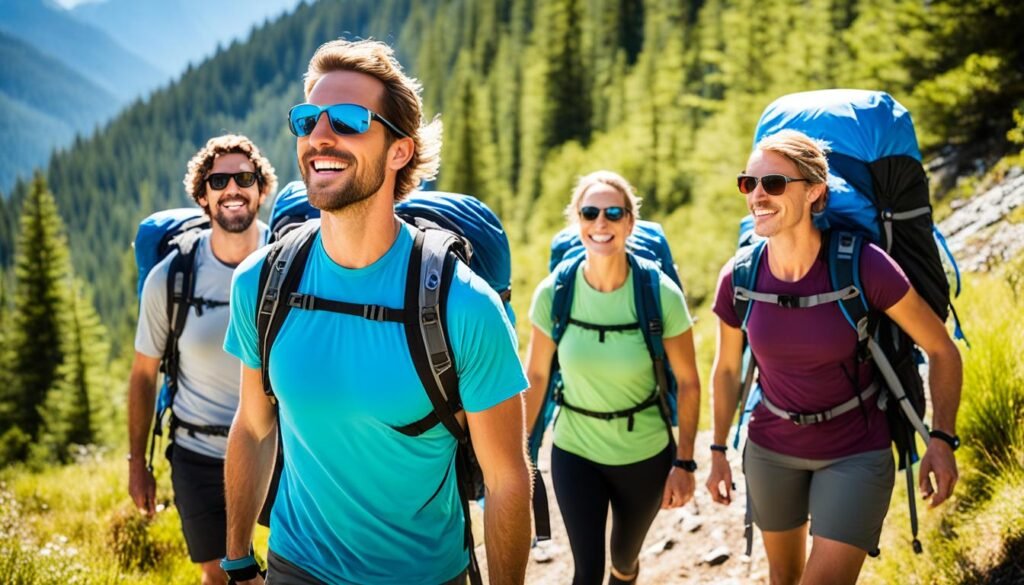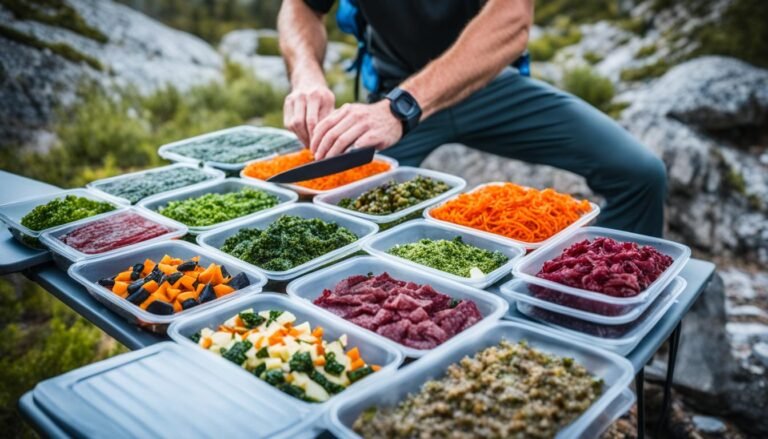Tread Lightly: Our Top Eco-Friendly Hiking Tips

Have you ever thought about the footprint you might be leaving behind on nature’s pristine trails? As ardent lovers of the outdoors, we’re about to break down top eco-friendly hiking tips that marry our passion for adventure with our duty to protect this gorgeous planet. But here’s the kicker: going green while hiking doesn’t mean you have to compromise on comfort or convenience. Whether you’re an expert hiker or a beginner, adopting sustainable outdoor practices transforms not just your trekking adventures but also cultivates a mindset that values Mother Nature.
From ditching single-use plastics for reusable gear to choosing locally sourced food for the trails, we’ll be exploring an array of environmentally friendly hiking practices that will help you adventure responsibly. So strap on your boots, fill up your water bottles, and get ready to show the trails some love – the green way!
Key Takeaways
- Green hiking practices beyond just picking up trash. Think sustainable preparation, nutrition choices, and gear.
- Eco-friendly hiking isn’t a lifestyle compromise but a lifestyle enhancement that merges adventure with sustainability.
- Every action, from the gear we choose to the food we pack, counts towards a greener and cleaner hiking experience.
- Implementing these eco-friendly hiking tips serves a dual purpose: keeping us comfortable on the trails and reducing the negative impact on the environment.
- Ever heard of reducing your carbon footprint, one hike at a time? It’s possible, and we will show you how.
Embracing the Leave No Trace Principles
It’s not just about the journey, folks. It’s also about ensuring that our beloved trails remain as immaculate as when we found them. How so? Well, by embracing the Leave No Trace behind principle, of course! It’s a pretty simple mantra that’s essential for low-impact trekking. Plus, it gives you those warm, fuzzy feelings knowing you’re doing your bit for Mother Nature.
Packing Out Trash and Recycling
Ever heard of the life-changing magic of tidying up? Well, it works wonders for hiking too! Be it that banana peel, granola bar wrapping or even a fallen button, it’s gotta come back with us. Yep! Even so-called ‘biodegradable’ items can pack a punch to the delicate balance of ecosystems. Remember: if you pack it in, you pack it out. Get yourself armed with a good rubbish bag for recyclables, and let’s get packing!
Picking up Litter Along Trails
Now, let’s talk about that other P—picking up litter. Even if it’s not ours, every little bit helps. Think of it as an international scavenger hunt, except the only prize is the satisfaction of knowing you’re making a difference. And, if you find yourself grimacing at the idea of picking up someone else’s trash, consider this: trash left on trails can harm wildlife and degrade the natural beauty of our favorite outdoor spots. So, let’s be eco-friendly hikers, one trash pickup at a time!
| Do’s | Don’ts |
|---|---|
| Carry a rubbish bag for recyclables | Leaving any kind of trash behind |
| Picking up litter along the trail | Ignoring trash left by others |
Choosing Sustainable Foods for the Trail

Embracing sustainable hiking habits and environmentally friendly hiking means indulging in more than just the panoramic vistas; we’re talking about savoring eco-conscious bites that tickle our taste buds while keeping Mother Nature happy. Yes, folks, your trailside munchies can carry a green ethos too!
Leaving behind those attractive, quick-grab wrappers for homemade gastronomic goodness is stepping in the right direction. By prepping your own trail mix or hummus wraps, each bite becomes a testament to your commitment to the environment. This saves on food miles – the distance food travels from the farm to your fork, or in this case, your hiking boots. Plus, you also get to take a big chomp out of the waste problem by ditching the excess plastic packaging.
“Eco-friendly food choices: Making hunger your excuse to go green!”
All that to say, your food can fuel more than just your trek – it’s fuel for change. Plus, let’s not forget the sense of accomplishment (and taste) that only a sandwich made with your own two hands can provide. There’s something about the calm of nature that makes our homemade goodies taste like a five-star meal prepared by Gordon Ramsay on an open campfire.
| Prepackaged Trail Food | Homemade Option |
|---|---|
| Instant oatmeal | Homemade muesli bars |
| Canned tuna/chicken | Cooked and dehydrated chicken or beans |
| Bagged trail mix | Mixed nuts and dried fruits from bulk bins |
| Prepackaged meal bars | Whole grain wraps with hummus and veggies |
There you have it, folks – food for the body, peace for the mind, and love for the earth. That’s the trifecta of responsible, environmentally friendly hiking. So, let’s whip up a batch of eco-friendly food choices and get ready for two types of recreation – dining in the great outdoors, and relishing the fact that we deserve the sustainable superheroes cape!
Eco-Friendly Hiking Tips for Gear and Apparel

One does not simply saunter into the wilderness without the right attire. Suiting up for our eco-adventures begins long before we set foot on the trail. Our commitment to the environment is reflected in the choices we make, from the eco-friendly hiking gear we use to the sustainable clothing we wear.
Investing in Durable Outdoor Gear
Think about it, folks. The longer our gear lasts, the less often we have to replace it – reducing waste and saving those precious greenbacks. How cool is that? For those of us with a serious case of wanderlust, investing in durable gear is a no-brainer, an eco-brainer even!
Supporting Brands with Green Practices
Not all heroes wear capes, folks. Some wear sustainable clothing and support brands like Patagonia and Merrell, known for their eco-friendly initiatives. But, how do we tell the environmental saints from the sinners in the retail world? It’s easier than negotiating a mountainous trail during a snowstorm, we assure you.
| Brand | Eco-Friendly Practices |
|---|---|
| Patagonia | Uses organic and recycled materials, has repair and recycle program. |
| Merrell | Committed to reducing carbon emissions, incorporates recycled materials in products. |
Supporting these brands is not just about making a fashion statement on the trails. Far from it. It’s about expressing our respect for the environment and shouting from the mountaintops (metaphorically, of course) that green is the new black when it comes to hiking.
In the words of American writer Wallace Stegner,
“We simply need that wild country available to us, even if we never do more than drive to its edge and look in.”
So next time we venture to the ‘edge’, let’s do so in our
eco-friendly hiking gear
, making our personal style, the style of sustainability.
Conscious Planning: Before You Step Out
When it comes to conscious hiking preparation, remember it’s not all about lacing up those boots and pacing those trail contours. It’s also about the groundwork that precedes the actual hike. And for us purpose-driven tree huggers, it makes the difference between merely enjoying the outdoors and fostering sustainable hiking habits.
How so, you ask? Well…
- Deep diving into trail rules, obviously! Don’t wander off the beaten path (Quite literally!).
- Keep yourself abreast of potential hazards and closures. Nature can throw its own surprise parties you’d rather RSVP a ‘No’ to.
- Armed with knowledge, pack appropriately. No, we don’t mean shoving all you own into that backpack! Leave those proverbial kitchen sinks behind.
An excellent way to add eco-conscious outdoor tips to your armory is by doing the seemingly mundane things right. You might argue that signing logbooks doesn’t exactly scream ‘green-pin’. True. But it does make tracking and management easier, helping maintain those trails we so dearly love!
Attention to detail is key. How about using reusable toiletry bottles? Or better yet, choosing eco-friendly personal products like sunscreen and bug spray. I mean, why let those pesky bugs feast away when we can keep them at bay with something that doesn’t harm our beloved planet?
By ensuring that our individual well-being aligns with the planet’s, we foster a bond and mutual respect. It’s called symbiosis, folks! The outdoors is our playground, and let’s keep it lush, green, and forever inviting.
So, as we lace up our boots for the next outdoor wild-out, remember to plan, prepare, and execute consciously. Let our love for hiking be the love song our planet needs.
Reducing Our Carbon Footprint with Each Step
When it comes to eco-conscious hiking, we often focus on our actions on the trail. But what about the journey to get there? By being strategic in how we approach our hiking trips, we can continue our low-impact trekking principles and significantly reduce our carbon footprint. Let’s dig into some ways how.
Opting for Nearby Trails to Lower Emissions
Don’t get us wrong, those distant, Instagram-worthy trails await our footsteps. However, selecting trails closer to home can be part of our carbon emission reduction strategy. Cutting the miles we travel to access nature not only helps fuel our wallets, but the planet too. After all, adventures start at home – well, near home, at least!
Car-free Journey to the Trailhead
Want to take your eco-conscious hiking up a notch? Consider swapping out that gas-guzzler for a hike or bike to the trail, or hop on public transportation (yes, buses can be adventurous too). Not only will our legs thank us for the warm-up, but Mother Earth might just breathe a little easier as well. Let’s not forget, every journey begins with a single step, even the journey to preserving our environment.
FAQ
What are some top eco-friendly hiking tips?
Some of our top tips include adopting Green hiking practices, exercising sustainable outdoor practices, and embracing environmentally friendly habits throughout the hike. Key practices include sticking to marked trails, minimizing waste, and adopting a ‘pack it in, pack it out’ mentality.
How can I embrace the ‘Leave No Trace’ principles?
Leave No Trace principles are fundamental for low-impact trekking. This includes packing out trash and recycling, staying only on designated trails, minimizing campfire impacts, and being respectful of wildlife. It might also involve picking up litter along trails left behind by others.
What are some sustainable food options for hiking?
Opting for real, homemade food over pre-packaged options contributes to sustainable hiking habits. Foods such as homemade muesli bars or hummus wraps not only reduce food miles and packaging waste but also provide nourishing and delicious snacks for your adventure.
How can I make eco-friendly choices when it comes to hiking gear and apparel?
Investing in durable, sustainable clothing and gear from brands committed to reducing their environmental impact is critical. Brands like Patagonia and Merrell are examples of companies that are committed to green practices. In addition to durability and sustainability, consider gear that can be reused, like water bottles and beeswax food wraps, as they help reduce waste.
How can I plan more consciously before a hike?
Conscious planning involves understanding trail rules, staying informed about potential hazards and closures, and packing appropriately. Consider signing trail logbooks, using reusable toiletry bottles, and choosing eco-friendly personal products, such as sunscreen and bug spray. These steps ensure that your wellbeing aligns with that of the planet.
What are some ways to reduce carbon footprint while hiking?
You can reduce carbon emissions by choosing hiking spots closer to home and considering a car-free journey to the trailhead, either on foot, by bike, or using public transportation. This ensures that your enjoyment of nature doesn’t come at the cost of its health, reducing your carbon footprint one step at a time.









